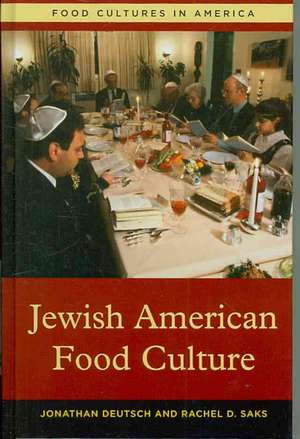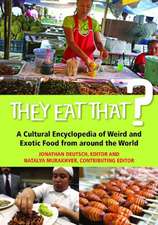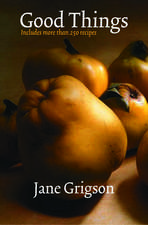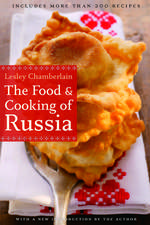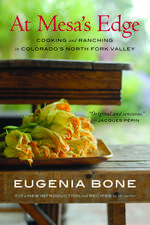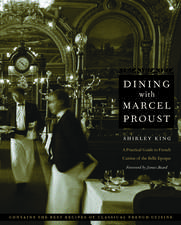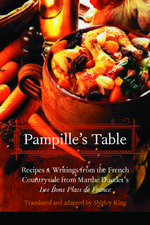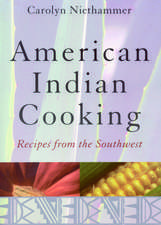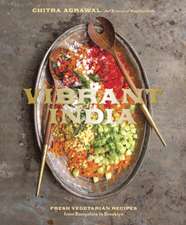Jewish American Food Culture: Food Cultures in America
Autor Jonathan Deutsch, Rachel D. Saksen Limba Engleză Hardback – 27 feb 2008 – vârsta până la 17 ani
| Toate formatele și edițiile | Preț | Express |
|---|---|---|
| Paperback (1) | 128.67 lei 3-5 săpt. | |
| BISON BOOKS – oct 2009 | 128.67 lei 3-5 săpt. | |
| Hardback (1) | 234.95 lei 6-8 săpt. | |
| Bloomsbury Publishing – 27 feb 2008 | 234.95 lei 6-8 săpt. |
Preț: 234.95 lei
Preț vechi: 408.03 lei
-42% Nou
Puncte Express: 352
Preț estimativ în valută:
44.96€ • 46.94$ • 37.12£
44.96€ • 46.94$ • 37.12£
Carte tipărită la comandă
Livrare economică 15-29 aprilie
Preluare comenzi: 021 569.72.76
Specificații
ISBN-13: 9780313343193
ISBN-10: 0313343195
Pagini: 168
Dimensiuni: 156 x 235 x 18 mm
Greutate: 0.41 kg
Editura: Bloomsbury Publishing
Colecția Greenwood
Seria Food Cultures in America
Locul publicării:New York, United States
ISBN-10: 0313343195
Pagini: 168
Dimensiuni: 156 x 235 x 18 mm
Greutate: 0.41 kg
Editura: Bloomsbury Publishing
Colecția Greenwood
Seria Food Cultures in America
Locul publicării:New York, United States
Notă biografică
Jonathan Deutsch is Assistant Professor of Tourism and Hospitality and Director of the Culinary Management Center, Kingsborough Community College, City University of New York, Secretary of the Association for the Study of Food and Society, and co-editor of Gastropolis: Food and New York City (2008).Rachel D. Saks is a graduate student in Nutrition and Dietetics at New York University. She has attended various culinary schools.
Cuprins
Series ForewordIntroductionChronology1.Historical Overview2.Major Foods and Ingredients3.Cooking4.Typical Meals5.Eating Out6.Special Occasions7.Diet and HealthGlossaryResource GuideSelected BibliographyIndex
Recenzii
Jewish American Food Culture is an essential one-stop resource for every library: this is the source to find our what 'parve' on packaging means, the symbolism of particular foods that are essential to holiday celebrations, what keeping kosher entails, how meals and food rituals are approached differently depending on how religious one is and the land of one's ancestors, and much more.
This book is one in a series on Food Cultures in America, which intends to show how different ethnic and regional food cultures have become part of American identity. As the authors explain in their introduction, the Jewish contribution to food culture in the US is complicated because of the Diaspora background of US Jews from Europe, Northern Africa, the Middle East, and Central Asia. . . . Recommended. General and undergraduate collections.
Jewish American Food Culture encompasses the vast diversity of Jewish Americans-those who observe the Jewish dietary laws of kashrut(keeping kosher), those born into the Jewish faith who do not actively practice the religion, Jews of various European heritages, Arabic-speaking Jewish Americans, the Hasidic Jews of Brooklyn, and intermarried families in the multiethnic suburbs of Los Angeles. Each volume in this series contains a foreword, an introduction, a chronology, line drawings and photos, recipes, a glossary, a resource guide, a selected bibliography, and an index.
Jewish American Food Culture is a welcome new resource for classes in American studies, anthropology, folklore, foodways, Jewish studies, and religious studies. The non-scholarly reader will also enjoy the work. . . . They do an excellent job of covering vast expanses of territory, time, and space -- from the ancient Middle East to contemporary America, and they do so gracefully and with good humor.
Jewish American Food Culture offers a good introduction to American Jewish culinary traditions. It is a good addition to high school, public, and synagogue libraries.
A small book that crams a large amount of information on the eating proclivities of American Jews into its pages. The dominant theme is Ashkenazic, but the authors also include Sephardic traditions, too. Recipes for basic holiday foods are included, along with an explanation of kashrut. This would serve as a good basic introduction, and possibly as a handbook for caterers.
This book is one in a series on Food Cultures in America, which intends to show how different ethnic and regional food cultures have become part of American identity. As the authors explain in their introduction, the Jewish contribution to food culture in the US is complicated because of the Diaspora background of US Jews from Europe, Northern Africa, the Middle East, and Central Asia. . . . Recommended. General and undergraduate collections.
Jewish American Food Culture encompasses the vast diversity of Jewish Americans-those who observe the Jewish dietary laws of kashrut(keeping kosher), those born into the Jewish faith who do not actively practice the religion, Jews of various European heritages, Arabic-speaking Jewish Americans, the Hasidic Jews of Brooklyn, and intermarried families in the multiethnic suburbs of Los Angeles. Each volume in this series contains a foreword, an introduction, a chronology, line drawings and photos, recipes, a glossary, a resource guide, a selected bibliography, and an index.
Jewish American Food Culture is a welcome new resource for classes in American studies, anthropology, folklore, foodways, Jewish studies, and religious studies. The non-scholarly reader will also enjoy the work. . . . They do an excellent job of covering vast expanses of territory, time, and space -- from the ancient Middle East to contemporary America, and they do so gracefully and with good humor.
Jewish American Food Culture offers a good introduction to American Jewish culinary traditions. It is a good addition to high school, public, and synagogue libraries.
A small book that crams a large amount of information on the eating proclivities of American Jews into its pages. The dominant theme is Ashkenazic, but the authors also include Sephardic traditions, too. Recipes for basic holiday foods are included, along with an explanation of kashrut. This would serve as a good basic introduction, and possibly as a handbook for caterers.
